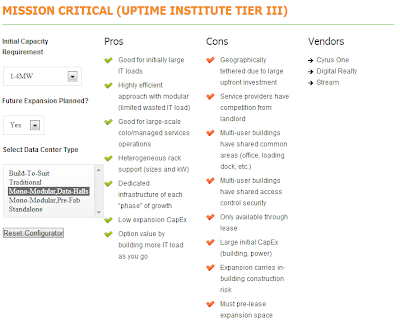– Chris Crosby, CEO of Compass Datacenters, says:
Not every customer has the same data center requirements; and not every “modular” offering meets the definitional standard of that term, has the same capabilities, or can provide a standalone solution that meets the customer’s needs. Choosing the wrong solution often means years of headaches, which is why it is so important for a company’s planning process to successfully select a facility that is a function of the specific problems that need to be addressed. To assist companies with that process, Compass has developed a data center configurator to help businesses easily determine the right data center for their needs, ensuring that the path they take will give them a facility that is the right fit.
Using a model similar to the one used by insurance companies like Progressive, the configurator has been designed to enable a user to select the information that best reflects their requirements to determine the type of data center that best corresponds to them. The configurator is vendor-neutral, providing objective advice that is not just a veiled sales pitch. The configurator is available on our websiteand is free for anyone to use.
The tool is designed to walk the user through a series of steps that identify their data center requirements and the correct data center alternatives. The process begins by asking whether the data center will be used to support mission critical or non-mission critical applications. The user is then prompted to determining the size requirement of the initial facility and whether or not future expansion is planned. These initial submissions are used to provide the user with a list of the data center types that could satisfy their requirements. At this point the user is able to view each alternative and is presented with a list of pros and cons for each possible alternative (containers for example) as well as a list of all the providers of that solution type.
For example, a user requiring a mission critical data center with an initial requirement of 1-4MW with plans to expand would be presented with the five potential types of data centers (Build to Suit, Traditional, Monolithic Modular-Data Halls, Monolithic Modular-Pre-Fabricated, and Standalone). If they were to click on Monolithic Modular-Pre-Fabricated they would see not only the strengths and weaknesses of that approach but that IO is the only provider for that solution.
The provision of this information enables prospective data center customers to quickly understand their alternatives and identify the data center type and providers that can best address their needs to dramatically reduce the information gathering stage of the new data center acquisition process. We hope it proves to be a valuable tool for many companies as they begin the planning process for their next data center. To take it for a test drive, visit http://www.compassdatacenters.com/type-data-center-need/.




